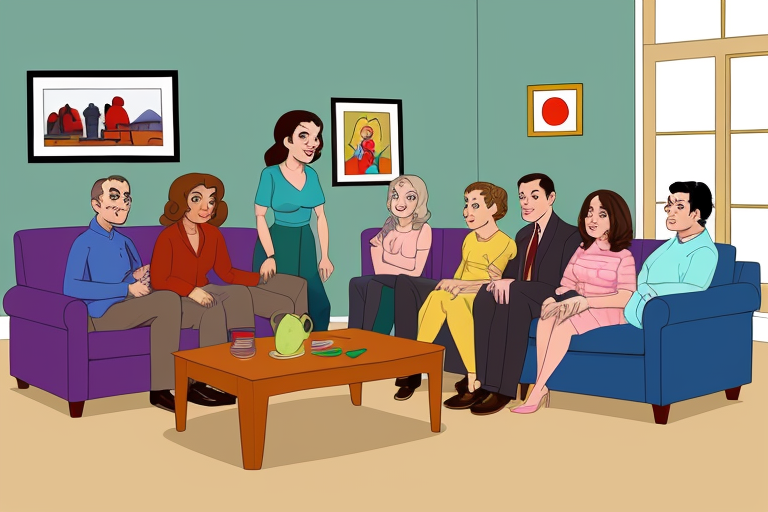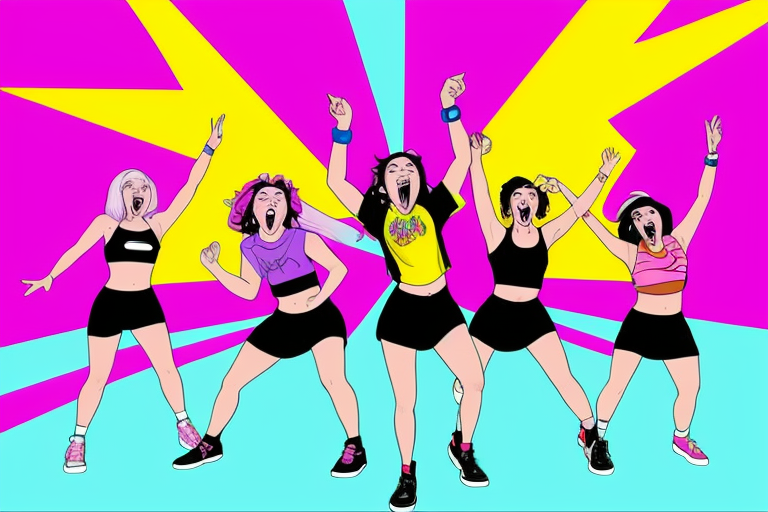The Importance and Evolution of Sitcoms
Sitcoms have been a staple of television for decades, providing viewers with laughter, relatable characters, and memorable moments. From the early days of television to the present, sitcoms have undergone significant changes, reflecting the shifting values and attitudes of society. In this article, we will explore the evolution of sitcoms, examining how they have changed over time and their impact on pop culture.
Sitcoms first emerged in the 1950s, with shows like I Love Lucy and The Honeymooners paving the way for future sitcoms. These early sitcoms were often filmed in front of a live audience and featured simple storylines and characters. However, as television technology improved, so did the production quality of sitcoms. In the 1970s and 1980s, shows like Happy Days and The Cosby Show became cultural phenomena, showcasing a more diverse range of characters and storylines.
The 1990s saw a surge in sitcom popularity, with shows like Friends, Seinfeld, and The Fresh Prince of Bel-Air dominating the airwaves. These shows featured more complex characters and storylines, often tackling social issues and exploring the intricacies of human relationships. They also paved the way for a new generation of sitcoms, which continue to evolve and push the boundaries of the genre.
Today’s sitcoms reflect the changing values and attitudes of society, with shows like Schitt’s Creek and Black-ish exploring issues of diversity and representation. They also feature a wider range of humor, from slapstick comedy to witty banter, appealing to a broader audience.
The evolution of sitcoms has had a significant impact on pop culture, influencing everything from fashion to music. Iconic sitcoms like Friends and Seinfeld have become cultural touchstones, with their catchphrases and characters still resonating with audiences today. They have also inspired a new generation of sitcoms, which continue to push the boundaries of the genre and reflect the changing values and attitudes of society.
In this article, we will explore the evolution of sitcoms in more detail, examining how they have changed over time and their impact on pop culture. We will also examine the role of humor, character development, and social commentary in the sitcom genre. By the end of this article, we hope to provide readers with a comprehensive understanding of the evolution of sitcoms and their enduring legacy.
Stay tuned for the next section, where we will explore the evolution of humor in sitcoms and how it has changed over time.
The Evolution of Humor in Sitcoms
Sitcoms have come a long way since the early days of television, where slapstick humor was the norm. Today, sitcoms feature a wide range of humor, from witty banter to absurd situations. The evolution of humor in sitcoms has been shaped by changing societal values, advancements in technology, and the emergence of new comedic talent.
One of the most significant changes in sitcom humor has been the shift from physical comedy to verbal wit. Shows like I Love Lucy and The Three Stooges relied heavily on slapstick humor, with characters falling over and getting into physical altercations. However, as audiences became more sophisticated, sitcoms began to incorporate more clever wordplay and situational humor.
Modern sitcoms like The Big Bang Theory and Brooklyn Nine-Nine are prime examples of this evolution. These shows use witty banter and clever one-liners to generate laughs, rather than relying on physical comedy. The humor in these shows is often more subtle and nuanced, requiring viewers to pay closer attention to the dialogue.
Another significant change in sitcom humor has been the emergence of shows that tackle more serious topics. While sitcoms have always been a form of escapism, many modern shows use humor to address social issues and raise awareness about important topics. For example, shows like Black-ish and One Day at a Time tackle issues like racism, sexism, and mental health in a way that is both funny and thought-provoking.
The evolution of humor in sitcoms can also be seen in the way that characters are portrayed. In the early days of television, characters were often one-dimensional and relied on stereotypes for laughs. However, as audiences became more discerning, sitcoms began to feature more complex and nuanced characters.
Shows like Friends and Schitt’s Creek are prime examples of this evolution. These shows feature characters that are flawed and multi-dimensional, with their own unique quirks and personalities. The humor in these shows often comes from the interactions between characters, rather than from cheap jokes or slapstick humor.
Overall, the evolution of humor in sitcoms has been a positive one, with shows becoming more sophisticated and nuanced over time. While physical comedy still has a place in the genre, modern sitcoms have shown that there is room for a wide range of humor styles. As the genre continues to evolve, it will be interesting to see what new forms of humor emerge and how they shape the future of sitcoms.
The Changing Landscape of Character Development in Sitcoms
Sitcoms have come a long way since their inception, and one area where they have evolved significantly is in character development. In the past, sitcoms often relied on one-dimensional characters with predictable storylines and little room for growth. However, modern sitcoms have changed the game by introducing complex characters with nuanced storylines that reflect the changing values and attitudes of society.
One of the most significant changes in character development is the shift towards more diverse and inclusive representation. Shows like Friends, which were once considered groundbreaking for their portrayal of a diverse group of friends, are now criticized for their lack of representation. In contrast, shows like Schitt’s Creek have been praised for their inclusive representation of LGBTQ+ characters. The show’s portrayal of David Rose, a pansexual character, has been particularly lauded for its nuanced and authentic depiction of a queer character.
The evolution of character development is also evident in the way sitcoms approach mental health and other social issues. In the past, sitcoms often shied away from tackling difficult topics, but modern shows have embraced them. For example, Bojack Horseman, an animated sitcom, has been praised for its portrayal of mental health and addiction. The show’s titular character, a washed-up actor struggling with depression and addiction, is a complex and nuanced portrayal of mental illness.
When it comes to character development, Friends and Schitt’s Creek offer two very different approaches. Friends, which premiered in 1994, was a product of its time. The show’s characters were often defined by their relationships and romantic entanglements, and their storylines were often predictable. In contrast, Schitt’s Creek, which premiered in 2015, offers a more nuanced and authentic portrayal of character development. The show’s characters are complex and multi-dimensional, and their storylines are often unexpected and surprising.
The changing societal values and attitudes have played a significant role in the evolution of character development in sitcoms. In the past, sitcoms often reflected the dominant cultural values of the time, which were often conservative and traditional. However, as society has become more diverse and inclusive, sitcoms have followed suit. Shows like Schitt’s Creek and Bojack Horseman are a reflection of the changing values and attitudes of society, and they offer a more authentic and nuanced portrayal of character development.
Tackling Social Issues
Sitcoms have always been a reflection of society, and as societal values and attitudes have evolved, so have the themes and topics explored in sitcoms. In recent years, sitcoms have become a platform for tackling social issues and promoting social change. One of the most significant ways in which sitcoms have contributed to social change is through their representation of the LGBTQ+ community.
Shows like Will & Grace, which premiered in 1998, were groundbreaking in their portrayal of gay characters. The show was praised for its positive representation of LGBTQ+ characters and its role in promoting acceptance and understanding. Since then, many other sitcoms have followed suit, including Modern Family, Brooklyn Nine-Nine, and Schitt’s Creek. These shows have helped to normalize LGBTQ+ characters and relationships on television and have contributed to a more accepting and inclusive society.
Another way in which sitcoms have tackled social issues is through their portrayal of mental health. Shows like BoJack Horseman and Crazy Ex-Girlfriend have explored mental health issues in a way that is both honest and relatable. These shows have helped to reduce the stigma surrounding mental health and have encouraged viewers to seek help when they need it.
Diversity is another important social issue that sitcoms have tackled in recent years. Shows like Black-ish and Master of None have explored issues of race and ethnicity in a way that is both entertaining and informative. These shows have helped to promote understanding and acceptance of different cultures and have contributed to a more diverse and inclusive society.
The impact of social commentary on the sitcom genre cannot be overstated. Shows that tackle important social issues are not only entertaining but also have the power to educate and inspire. By shining a light on important issues, sitcoms have the ability to promote positive change and contribute to a better world.
One show that stands out for its social commentary is The Good Place. The show explores complex philosophical concepts in a way that is both entertaining and thought-provoking. The show’s portrayal of morality and ethics has sparked discussions and debates among viewers and has encouraged people to think more deeply about their own values and beliefs.
The Legacy of Classic Sitcoms
Classic sitcoms like Seinfeld, Friends, and The Cosby Show have had a significant impact on the genre and pop culture. These shows paved the way for modern sitcoms and set the standard for what audiences expect from the genre. They also introduced iconic characters and storylines that continue to influence popular culture today.
Seinfeld, for example, is often cited as one of the greatest sitcoms of all time. The show’s unique blend of humor and relatable characters made it a hit with audiences in the 90s and continues to attract new fans today. The show’s legacy can be seen in modern sitcoms like It’s Always Sunny in Philadelphia, which features a similar group of self-centered friends who get into ridiculous situations.
Friends is another classic sitcom that has had a lasting impact on the genre. The show’s relatable characters and witty humor made it a cultural phenomenon in the 90s and early 2000s. The show’s influence can be seen in modern sitcoms like New Girl, which features a group of friends navigating life in their 20s and 30s.
The Cosby Show, despite the controversy surrounding Bill Cosby, is another classic sitcom that had a significant impact on the genre. The show was groundbreaking in its portrayal of an affluent African American family and tackled issues like race and class in a way that had never been seen on television before. The show’s legacy can be seen in modern sitcoms like Black-ish, which also features an affluent African American family navigating modern-day issues.
The impact of classic sitcoms on pop culture extends beyond the genre itself. These shows introduced iconic characters and catchphrases that have become ingrained in popular culture. For example, Seinfeld introduced the “Soup Nazi,” a character who has become a cultural touchstone. Friends introduced the “Rachel” haircut, which became a popular hairstyle in the 90s.
The legacy of classic sitcoms is not just limited to their impact on pop culture. These shows have also had a lasting impact on future generations. Many people who grew up watching these shows now introduce them to their children, passing on their love of the genre to a new generation. The impact of classic sitcoms can also be seen in modern sitcoms, which often pay homage to these shows through references and Easter eggs.
The New Age of Sitcoms
Sitcoms have come a long way since the days of I Love Lucy and The Honeymooners. In recent years, modern sitcoms have taken the world by storm, with shows like The Big Bang Theory and Schitt’s Creek becoming household names. These shows have brought a fresh perspective to the genre, with new and exciting storylines, characters, and humor.
One of the most significant changes in modern sitcoms is the shift towards more character-driven storylines. Instead of relying on traditional situational comedy, modern sitcoms focus on character development and relationships. Shows like Schitt’s Creek have gained a massive following due to their relatable and complex characters. The show’s portrayal of the Rose family’s journey from wealthy socialites to small-town residents has resonated with audiences worldwide.
Another hallmark of modern sitcoms is their ability to tackle social issues head-on. Shows like The Big Bang Theory and Brooklyn Nine-Nine have addressed topics like mental health, diversity, and LGBTQ+ representation. These shows have helped to break down barriers and promote acceptance and understanding.
Despite these changes, modern sitcoms still draw inspiration from classic shows. The Big Bang Theory, for example, pays homage to shows like Star Trek and The Twilight Zone. Schitt’s Creek, on the other hand, has been compared to classic sitcoms like Arrested Development and The Office. These references serve as a reminder of the genre’s roots while also pushing it in new and exciting directions.
The rise of modern sitcoms has also led to a renewed interest in the genre. Streaming services like Netflix and Hulu have made classic shows like Friends and Seinfeld more accessible to younger audiences. This renewed interest has sparked debates about the genre’s legacy and its place in pop culture.
As for the future of the sitcom genre, only time will tell. With new shows like Ted Lasso and Hacks gaining critical acclaim, it’s clear that the genre is still alive and well. However, as societal values and attitudes continue to evolve, it’s likely that sitcoms will continue to change and adapt.
Modern Sitcoms: A New Era of Comedy
Sitcoms have come a long way since the days of I Love Lucy and The Honeymooners. Today, we have a new generation of shows that have taken the genre to new heights. The rise of modern sitcoms like The Big Bang Theory and Schitt’s Creek has introduced us to a new era of comedy.
One of the defining characteristics of modern sitcoms is their relatability. Shows like The Office and Parks and Recreation feature characters that we can see ourselves in. They deal with everyday problems and situations that we can all relate to. This makes the humor more accessible and enjoyable for a wider audience.
Another aspect of modern sitcoms is their willingness to tackle serious issues. Shows like Black-ish and Master of None have addressed topics like race, gender, and sexuality in a way that is both informative and entertaining. By incorporating social commentary into their storylines, these shows have become more than just comedies; they have become a platform for important conversations.
Of course, modern sitcoms are not without their critics. Some argue that the humor is too formulaic and predictable. Others say that the characters lack depth and complexity. While these criticisms may be valid in some cases, it’s important to remember that sitcoms are meant to be lighthearted and fun. They are not meant to be taken too seriously.
When comparing modern sitcoms to the classics, it’s clear that there are some similarities and differences. Both eras have produced shows that are beloved by audiences around the world. However, modern sitcoms have the advantage of being able to draw from a wider range of experiences and perspectives. This has allowed for more diverse and inclusive storytelling.
As for the future of the sitcom genre, it’s hard to say what’s in store. With the rise of streaming services like Netflix and Hulu, there are more opportunities than ever for new shows to be produced and distributed. However, with so much competition, it’s also harder than ever for a show to stand out and gain a dedicated following.









